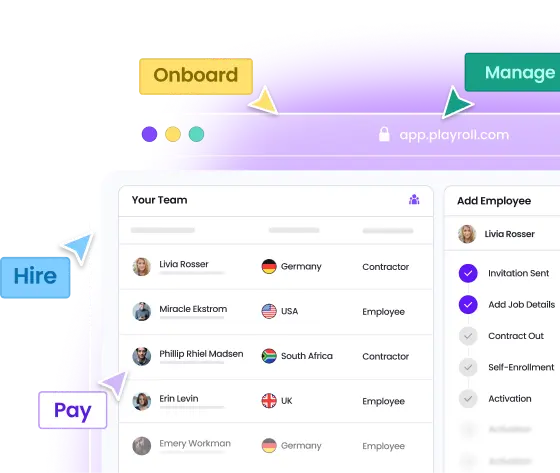What Are the Standard Working Hours In China?
An employee whose age is 16 or younger is generally prohibited from working under China's labor laws. For employees aged 18 or older, the standard working hours are a maximum of 8 hours per day and 40 hours per week. Employees are entitled to at least a 60-minute meal break if they work more than 4 hours in a day. Typical working hours run Monday through Friday, generally from 9:00 AM to 6:00 PM, with a one-hour lunch break, although this may vary by employer or local practice.
Maximum Working Hours in China
Under China's Labor Law and the Labor Contract Law, the legal cap on working hours is 8 hours per day and 40 hours per week. Work beyond this limit is considered overtime and is subject to specific regulations.
- Daily and Weekly Caps: The standard is 8 hours/day and 40 hours/week.
- Overtime Exceptions: Overtime is allowed only under exceptional circumstances such as emergencies or production requirements. Employers must obtain consent from employees before scheduling overtime.
- Restrictions: Overtime work generally cannot exceed 3 hours per day and 36 hours per month.
- Employers must pay overtime premiums for work outside standard hours.
Industry Specific Exceptions
Certain industries in China have special rules due to the nature of their work:
- Healthcare: Medical staff may have flexible or extended shifts due to patient care demands.
- Transportation: Transportation workers such as drivers have specific limits to ensure safety, often stricter than the general labor rules.
- Manufacturing and Construction: May have extended work hours during peak production periods, but must comply with monthly overtime limits.
These industries are allowed some deviations from the standard 8-hour day due to operational necessities but must comply with overtime compensation laws.
Managerial and Exempt Employees
Managerial and senior professional employees in China are generally exempt from overtime regulations.
- Definition: Managerial staff are those with decision-making authority, such as department heads or senior executives.
- Working Hours: Such employees are typically not subject to daily or weekly maximum working hour limits.
- Compensation: They usually do not receive overtime pay but may have higher fixed salaries reflecting their exemption status.
Statutory Full-Time Working Hours in China
Full-time employment in China is legally defined as work where employees adhere to the standard weekly hours of 40 hours.
- Weekly Hours: 40 hours per week, typically 8 hours per day, Monday to Friday depending on the region or employer.
- Application: These hours apply broadly across industries, but some sectors have negotiated different working schedules under collective agreements or government permits.
Overtime Regulations in China
Overtime in China is strictly regulated to protect employees' rights and ensure fair compensation. Employers must follow statutory limits and pay premiums for overtime hours worked.
What Counts As Overtime in China?
Overtime includes:
- Hours worked beyond 8 hours per day or 40 hours per week.
- Work on weekends that is not compensated by a day off.
- Work on public holidays.
Maximum Overtime in China
- Monthly Limit: Overtime must not exceed 36 hours per month.
- Daily Limit: No more than 3 hours of overtime per day.
- Penalties: Employers violating these caps risk penalties from labor authorities, including fines and orders to compensate employees accordingly.
Overtime Payout Rates in China
The law mandates premium pay rates for overtime:
- Weekday Overtime: Paid at 150% of the regular hourly wage.
- Weekend Overtime: If no compensatory day off is given, paid at 200% of the regular wage.
- Public Holidays: Overtime on statutory holidays is paid at 300% of the regular wage.
These rates incentivize compliance and ensure fair remuneration for extended work.
Rest Periods and Breaks In China
Employees must receive adequate rest periods during work:
- Meal Breaks: A minimum 60-minute meal break for work shifts over 4 hours.
- Rest Between Shifts: At least 11 hours rest between workdays is recommended by regulations to protect employee health.
- Industry Specifics: Healthcare and transportation sectors may have additional rules for rest due to operational safety.
- Employers are responsible for ensuring these breaks are observed and cannot require employees to forgo them.
Night Shifts and Weekend Regulations
- Night Shift Definition: Work between 10:00 PM and 6:00 AM is classified as night shift.
- Weekend Work: Saturdays and Sundays are considered weekends.
- Additional Pay: Night shift workers receive at least 10% extra pay on top of regular wages.
- Weekend work is compensated at 200% of the standard rate if no substitute day off is granted.
Employers must ensure these compensations are paid and observe limits on night and weekend work to maintain compliance.
Disclaimer
THIS CONTENT IS FOR INFORMATIONAL PURPOSES ONLY AND DOES NOT CONSTITUTE LEGAL OR TAX ADVICE. You should always consult with and rely on your own legal and/or tax advisor(s). Playroll does not provide legal or tax advice. The information is general and not tailored to a specific company or workforce and does not reflect Playroll’s product delivery in any given jurisdiction. Playroll makes no representations or warranties concerning the accuracy, completeness, or timeliness of this information and shall have no liability arising out of or in connection with it, including any loss caused by use of, or reliance on, the information.
.svg)
.svg)
.svg)





.svg)



.png)












.webp)









.svg)